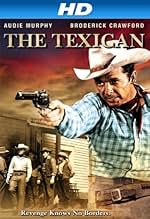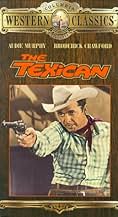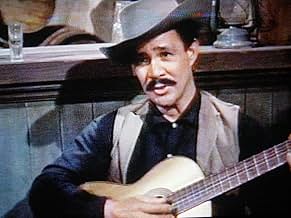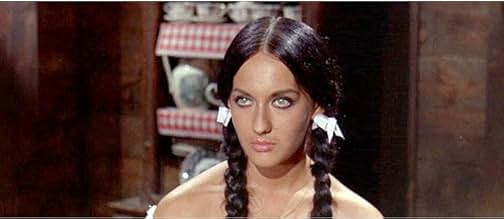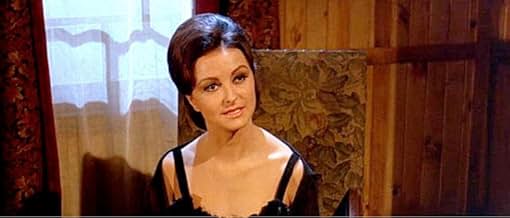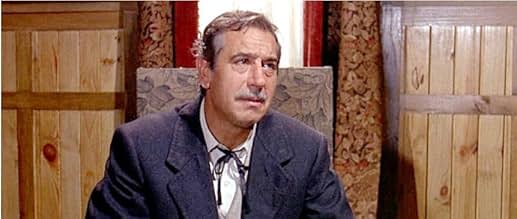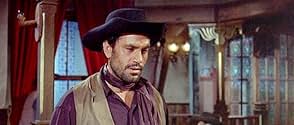IMDb-BEWERTUNG
5,8/10
1015
IHRE BEWERTUNG
Füge eine Handlung in deiner Sprache hinzuA former Texas sheriff, living in Mexico, goes to Arizona to investigate the murky circumstances under which his brother, a peaceful newspaperman, was killed.A former Texas sheriff, living in Mexico, goes to Arizona to investigate the murky circumstances under which his brother, a peaceful newspaperman, was killed.A former Texas sheriff, living in Mexico, goes to Arizona to investigate the murky circumstances under which his brother, a peaceful newspaperman, was killed.
- Regie
- Drehbuch
- Hauptbesetzung
Aldo Sambrell
- Gil Rio
- (as Aldo Sambrel)
Antonio Casas
- Frank Brady
- (as Anthony Casas)
Gérard Tichy
- Boyd Thompson
- (as Gerard Tichy)
Antonio Molino Rojo
- Harv
- (as Anthony Molino)
Juan Antonio Peral
- Eb
- (as John Peral)
Luz Márquez
- Sandy Adams
- (as Luz Marquez)
César Ojinaga
- Bounty Hunter
- (as Cesar Osinaga)
Empfohlene Bewertungen
To get some enjoyment from this movie you at least have to like Audie Murphy and be rather uncritical about westerns. I qualify on both counts. Besides, this movie also has Broderick Crawford as the tough-talking bad guy.
Past his Hollywood prime, Crawford here looks tired, overweight, and generally long in the tooth--but nobody talks tough like Broderick Crawford! The inimitable voices of these two actors--Murphy's gentle Texas voice and Crawford's gravelly growl--stand out in this movie, which otherwise is cast with Spaniards who are dubbed. The dubbing is occasionally distracting, and in the case of Antonio Casas as Frank Brady it is downright ludicrous.
Filmed in Spain, "The Texican" has a decidedly non-American score, sounding something like the music in Italian spaghetti westerns. There are a lot of surging crescendos and an ominous-sounding vocal chorus.
The less said about the actual story, the better. The fun is in watching Audie Murphy and Broderick Crawford do their thing. Murphy was a cowboy hero of mine when I was a boy in the 1950s, and of course in WW II he was a real hero--the most decorated soldier of the war.
They say Audie Murphy worked very hard to develop a fast draw, and in "The Texican" there are some examples of his fine hand with a pistol. Here, some 18 years after his first movie, he still seems like a "nice young man"--neatly dressed, slim and trim, courteous when he can be, gentle-voiced.
How did such a gentle man turn out to be so deadly with a gun--not just in the movies but in real life?
Past his Hollywood prime, Crawford here looks tired, overweight, and generally long in the tooth--but nobody talks tough like Broderick Crawford! The inimitable voices of these two actors--Murphy's gentle Texas voice and Crawford's gravelly growl--stand out in this movie, which otherwise is cast with Spaniards who are dubbed. The dubbing is occasionally distracting, and in the case of Antonio Casas as Frank Brady it is downright ludicrous.
Filmed in Spain, "The Texican" has a decidedly non-American score, sounding something like the music in Italian spaghetti westerns. There are a lot of surging crescendos and an ominous-sounding vocal chorus.
The less said about the actual story, the better. The fun is in watching Audie Murphy and Broderick Crawford do their thing. Murphy was a cowboy hero of mine when I was a boy in the 1950s, and of course in WW II he was a real hero--the most decorated soldier of the war.
They say Audie Murphy worked very hard to develop a fast draw, and in "The Texican" there are some examples of his fine hand with a pistol. Here, some 18 years after his first movie, he still seems like a "nice young man"--neatly dressed, slim and trim, courteous when he can be, gentle-voiced.
How did such a gentle man turn out to be so deadly with a gun--not just in the movies but in real life?
Times were getting hard for Audie Murphy in the '60s. He started getting financial problems, his personal life was going to hell, and the kind of westerns that had made him a star were starting to dry up. So he went to Spain to make this Spanish western. That fact did not bother me when I heard about this movie. Many of my favorite westerns are European westerns, so I was pretty intrigued to see what Europeans would do with a Hollywood star like Murphy.
I was disappointed with this movie in the end, however. I will admit that the sets are fine, and there is some good desert scenery. But I found the story surprisingly slow and dull. Murphy's character knows who the culprit is that murdered his brother, but he does pretty much nothing about it until the very end of the movie. Until that happens, the audience is treated to endless (and boring) chat, a bland villain, and a pretty bland hero as well.
The faults of this movie can probably be explained that while this was a European western, there was no Italian involvement. The Italians were the ones who really made European westerns shine, from the music to the scripts. Watch one of these kinds of European westerns instead of "The Texican", even if it doesn't contain a star as big as Murphy. You'll most likely be greater entertained.
I was disappointed with this movie in the end, however. I will admit that the sets are fine, and there is some good desert scenery. But I found the story surprisingly slow and dull. Murphy's character knows who the culprit is that murdered his brother, but he does pretty much nothing about it until the very end of the movie. Until that happens, the audience is treated to endless (and boring) chat, a bland villain, and a pretty bland hero as well.
The faults of this movie can probably be explained that while this was a European western, there was no Italian involvement. The Italians were the ones who really made European westerns shine, from the music to the scripts. Watch one of these kinds of European westerns instead of "The Texican", even if it doesn't contain a star as big as Murphy. You'll most likely be greater entertained.
Wanted man Audie Murphy risks his life returning to Texas in order to avenge his newspaperman brother who was murdered by sleazy town boss Broderick Crawford and his number one hired killer Aldo Sambrell.
Essentially American made, this is different than most U.S. helmed westerns shot in Spain in that it uses a primarily local crew and supporting cast, making it seem more like a real spaghetti western than other films Hollywood passed off in those days as Italian or Spanish made.
Into the film's heavy atmosphere walks a strangely out of place Audie Murphy. Short, neat, clean-cut and all-American, he's the last person you'd expect to see in a dirty, gritty spaghetti western town. He's almost like a visitor from a parallel universe! That said, it is interesting to see him in something different.
Fitting right in though is Crawford, playing the type of seedy character he built his Academy Award winning career upon and Aldo Sambrell, one of the most recognizable faces in European westerns, though virtually unknown by name.
As a film, The Texican isn't the most memorable of the genre, but it's pretty good with a nice wind-swept finale.
Essentially American made, this is different than most U.S. helmed westerns shot in Spain in that it uses a primarily local crew and supporting cast, making it seem more like a real spaghetti western than other films Hollywood passed off in those days as Italian or Spanish made.
Into the film's heavy atmosphere walks a strangely out of place Audie Murphy. Short, neat, clean-cut and all-American, he's the last person you'd expect to see in a dirty, gritty spaghetti western town. He's almost like a visitor from a parallel universe! That said, it is interesting to see him in something different.
Fitting right in though is Crawford, playing the type of seedy character he built his Academy Award winning career upon and Aldo Sambrell, one of the most recognizable faces in European westerns, though virtually unknown by name.
As a film, The Texican isn't the most memorable of the genre, but it's pretty good with a nice wind-swept finale.
Audie Murphy, the highest decorated U. S. soldier of WWII, gives a subtle and likable performance as Jess Carlin in the 1966 Spain-made spaghetti western, "The Texican", one of Murphy's last films.
Although Murphy was awarded every medal for valor available by the United States Army for his incredible bravery in combat (the Congressional Medal of Honor, the Distinguished Service Cross, the Silver Star, the Bronze Star, three Purple Hearts, among others) and is credited with the elimination of over 240 enemy soldiers, he was lightly regarded as an actor in Hollywood circles. Many of his performances were dismissed as "wooden" or "stoic". But in "The Texican", Murphy uses his two decades of action acting experience (almost exclusively as a Universal International contract player were he was a dependable money machine) to make this film entertaining and interesting to watch.
Performing all of his own stunts, Audie rides like the wind (bareback in a chase scene!), fights ferociously, and shoots (regarded as one of if not the fastest draw in Hollywood) his way to avenge the murder of his newspaper publishing brother, Roy Carlin. In some excellent casting concerning physical similarities to Murphy, Victor Vilanova gives a strong performance as Roy Carlin. He holds his own and then some opposite Best Actor Oscar Winner Brodrick Crawford, who delivers a rather pedestrian performance as the movie's antagonist, Luke Starr, the corrupt kingpin of the Texas town called Rimrock.
The movie's diamond in the rough is Diana Lorys, who plays bookkeeper Kit O'Neal, looking after her deceased father's interest in Starr's Silver Ring Hotel. Her acting is in fine emotional range from scornful to alluring, and as a result comes off as quite attractive. She is a definite plus for the film, and together with Murphy they generate a nice romantic electricity.
Notable acting comes from Aldo Sambrell as the hired gun, Luz Marquez as Sandy Adams, and Gerald Tichy as Boyd Thompson.
The script by John C. Champion and Jose Antonio de la Lama is tight and usually doesn't lag. It is somewhat choppily directed by Lesley Selander in a hurried fashion (not enough close ups as used so effectively by Sergio Leone), but he captures some fine steely-eyed looks from Audie during confrontational moments. More focus on the avenging aspect concerning character development was needed here. The locations in Spain are adequate to good and lend to that authentic Old West feel that made spaghetti westerns such a world-wide phenomenon. The musical score by Nico Fidenco is fairly good and avoids the copycat tones of Ennio Morricone that have marred many westerns. Changes that could have enhanced concern Murphy's wardrobe that is off the Gene Autry rack, and the cinematography by Francisco Marin is competent, but should have been more creative. The editing by Teresa Alcocer is pretty smooth.
So, pop some corn and pull up a chair for some vintage Audie in "The Texican" !
Although Murphy was awarded every medal for valor available by the United States Army for his incredible bravery in combat (the Congressional Medal of Honor, the Distinguished Service Cross, the Silver Star, the Bronze Star, three Purple Hearts, among others) and is credited with the elimination of over 240 enemy soldiers, he was lightly regarded as an actor in Hollywood circles. Many of his performances were dismissed as "wooden" or "stoic". But in "The Texican", Murphy uses his two decades of action acting experience (almost exclusively as a Universal International contract player were he was a dependable money machine) to make this film entertaining and interesting to watch.
Performing all of his own stunts, Audie rides like the wind (bareback in a chase scene!), fights ferociously, and shoots (regarded as one of if not the fastest draw in Hollywood) his way to avenge the murder of his newspaper publishing brother, Roy Carlin. In some excellent casting concerning physical similarities to Murphy, Victor Vilanova gives a strong performance as Roy Carlin. He holds his own and then some opposite Best Actor Oscar Winner Brodrick Crawford, who delivers a rather pedestrian performance as the movie's antagonist, Luke Starr, the corrupt kingpin of the Texas town called Rimrock.
The movie's diamond in the rough is Diana Lorys, who plays bookkeeper Kit O'Neal, looking after her deceased father's interest in Starr's Silver Ring Hotel. Her acting is in fine emotional range from scornful to alluring, and as a result comes off as quite attractive. She is a definite plus for the film, and together with Murphy they generate a nice romantic electricity.
Notable acting comes from Aldo Sambrell as the hired gun, Luz Marquez as Sandy Adams, and Gerald Tichy as Boyd Thompson.
The script by John C. Champion and Jose Antonio de la Lama is tight and usually doesn't lag. It is somewhat choppily directed by Lesley Selander in a hurried fashion (not enough close ups as used so effectively by Sergio Leone), but he captures some fine steely-eyed looks from Audie during confrontational moments. More focus on the avenging aspect concerning character development was needed here. The locations in Spain are adequate to good and lend to that authentic Old West feel that made spaghetti westerns such a world-wide phenomenon. The musical score by Nico Fidenco is fairly good and avoids the copycat tones of Ennio Morricone that have marred many westerns. Changes that could have enhanced concern Murphy's wardrobe that is off the Gene Autry rack, and the cinematography by Francisco Marin is competent, but should have been more creative. The editing by Teresa Alcocer is pretty smooth.
So, pop some corn and pull up a chair for some vintage Audie in "The Texican" !
What makes this paella western standout is Audie Murphy and Broderick Crawford, both of them were at the nadir of their career. Audie, in particular, is good as a gun fighter crossing the border to avenge his brother's death, and its really strange - and enjoyable - to see him ride the Spanish plains, dodging spaghetti style gunshots with the sound of orchestral music - it's like tradition-style meets spaghetti. Old guard mingled with new, and it works. Years of acting experience has boded well for Audie, he seems confident, is quite humorous and his playful romantic antics with the pretty Diana lorys is quite engaging. There's some exciting gunplay, good atmosphere and a windswept finale. Pity he didn't make more of these paella westerns as it could've prolonged his career, but Audie didn't like to travel aboard to make westerns, plus, as he said, he had to do all his stunts and pack his own lunch.
Wusstest du schon
- WissenswertesAudie Murphy made two more movies before his death in 1971: Gewehre zum Apachen-Paß (1967) and Zeit zum Sterben (1969).
- PatzerWhen Jess is chasing Kit O'Niel (Diana Lorys) in the wagon. Jess starts in a western saddle then appears next to the wagon, riding in a English saddle, then back to western saddle when he stops the horses.
- Zitate
Sandy Adams: Anyone who loses his saddle in open country is sure to lose his hide in Rimrock.
- VerbindungenFeatured in Biography: Audie Murphy: Great American Hero (1996)
Top-Auswahl
Melde dich zum Bewerten an und greife auf die Watchlist für personalisierte Empfehlungen zu.
- How long is The Texican?Powered by Alexa
Details
- Erscheinungsdatum
- Herkunftsländer
- Sprache
- Auch bekannt als
- El tejano temerario
- Drehorte
- Produktionsfirmen
- Weitere beteiligte Unternehmen bei IMDbPro anzeigen
- Laufzeit
- 1 Std. 21 Min.(81 min)
- Sound-Mix
- Seitenverhältnis
- 2.35 : 1
Zu dieser Seite beitragen
Bearbeitung vorschlagen oder fehlenden Inhalt hinzufügen


